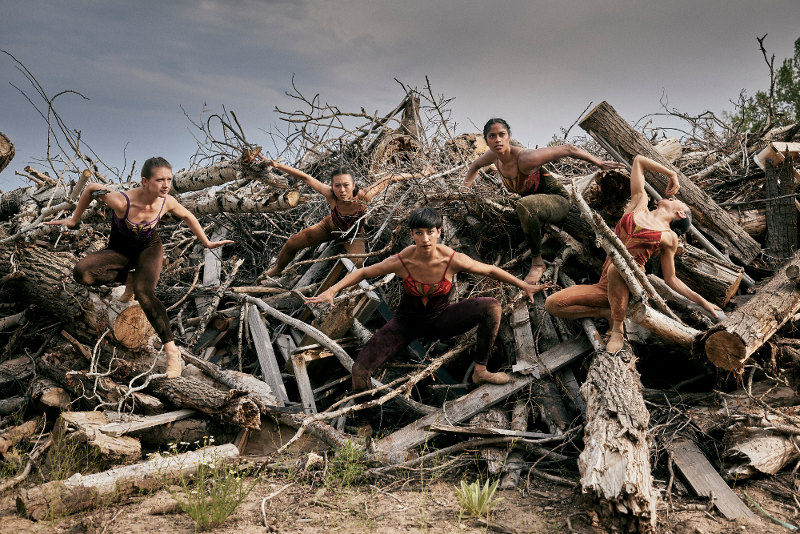
Some may have missed the moment when Dante Puleio assumed the helm of Limón Dance Company as Artistic Director. It happened during the summer of 2020. The world was in pandemic lockdown, and the dance universe faced one of the most difficult periods in its history. Yet somehow, Puleio, a former Limón company member, has been guiding the legacy company into its 75th anniversary season with a sense of abundance and possibility. Not only will the company fill its two-week New York City season at the Joyce with the classic masterpieces Air for the G String, Psalm, and Chaconne, but it will also premiere a re-imagination of a lost early Limón work, Danzas Mexicanas, as well as Waldstein Sonata, Limón’s final creation, completed by Dr. Daniel Lewis after Jose Limón’s death in 1972. And then there is a most exciting prospect for the season’s programming—two new works commissioned for the company.
In keeping with the commitment to celebrate José Limón’s artistic legacy and bring his humanistic intention and vision into the present moment and landscape, Puleio identified and commissioned two emerging choreographers, Olivier Tarpaga and Raúl Tamez. These talented new voices have thoroughly captured my attention while observing open rehearsals of their choreography. The excerpts I’ve seen display explosive power and echo Limón’s themes of identity, relationality, and hope.

Walking into the spacious Limón studios, I perked up to the reverberation of live music played by an ensemble of talented musicians coached by Tarpaga, who is also a composer. Amped guitar (bowed like a cello) and percussion instruments from every part of the globe created a world of sound that bound together the dancers and the dance with palpable intensity.
Before Puleio’s appointment as Artistic Director, he taught at the University of Florida. While there, he met Olivier Tarpaga, whom he describes as “a force of nature.” Tarpaga is a dancemaker and musician born and raised in the West African nation of Burkina Faso, a country riven by military coups, civil unrest, and mortal danger. Puleio immediately saw the similarity between Tarpaga’s personal story and creative influences and those of José Limón.
Tarpaga’s new work, titled Only One Will Rise, grapples with identity and otherness. The piece churns with powerful, instinctive movement infused with emotional urgency─ embodied by the Limón dancers, who have the monopoly on hurtling their bodies through space and recapturing equilibrium in a state of readiness for the next astounding moment. I was particularly blown away by a circle dance exuding primal energy. The dancers descend from an upright posture to the floor continuing their circular motion in plank position, like yoga warriors. It feels like Limón…on steroids.

The Limón Company’s invitation to Raúl Tamez is hugely significant, if not symbolic; he is the first Mexican choreographer to create for the company since José Limón. Tamez is known for extraordinary dancing, an entrepreneurial approach to producing independent artists, and his socially conscious sensibilities.
Puleio invited Tamez to create a work inresponse to Limón’s Tonantzintla (the name of a church in the town of Puebla, “Place of Our Little Mother”). Limón’s work was created in 1951 during a residency in Mexico City, and was inspired by the singular characteristics of this baroque Catholic church in the town of Puebla and its hybrid style—a combination of European baroque and indigenous Mexican iconography and craftmanship.
Through his piece Migrant Mother, Tamez offers a tribute to the majesty of the pre-hispanic heritage in Mesoamérica incorporating themes of migration, indigenous voices, symbolic domination, syncretism in México, and interculturality. The score consciously includes indigenous voices and endangered oral traditions while references to pre-hispanic mythology, ritual, iconography, and dance traditions are threaded through the piece.
The choreography communicates with solemn dignity the horrors, dehumanization, and death endured daily by Mexican migrants and gives voice to generations of Mexicans who, like Limón, fled and continue to flee their homeland seeking safety in United States. But Migrant Mother also exudes unreserved joy interweaving folkloric expressions, symbolic gesture, and technically demanding modern vocabulary—all danced with abandon at full throttle.
These new works are important on their own merit as they carry forth the transcendent Limón legacy of a humanistic approach to movement, theater, and conversation around the issues of our, and all, times. Not to be missed!
José Limón Dance Company | The Joyce Theater | April 19 – May 1
Karen Greenspan is a New York City-based dance journalist and the author of Footfalls from the Land of Happiness: A Journey into the Dances of Bhutan.
